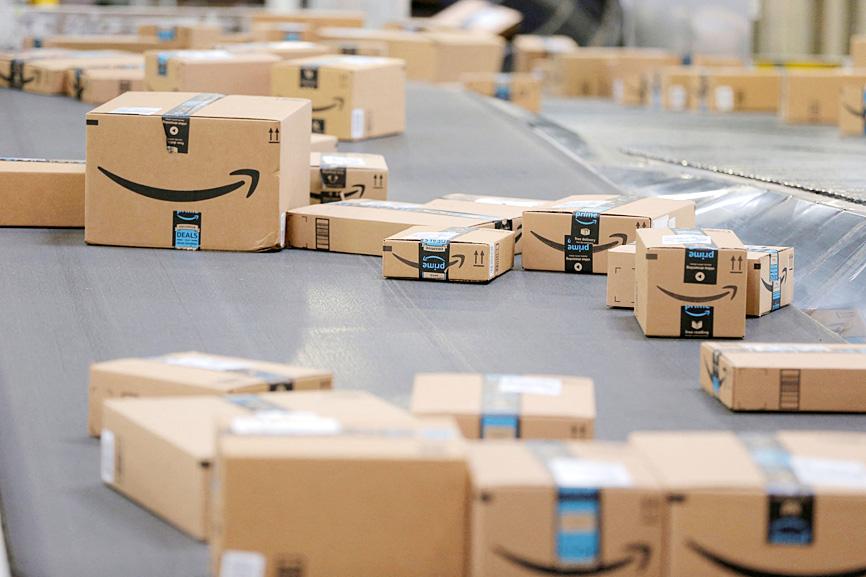Amazon.com Inc on Thursday reported its first quarterly loss since 2015, its money-making juggernaut stalled by a slowdown in COVID-19 pandemic-induced online shopping and a huge write-down of its investment in an electric-vehicle start-up.
The Seattle-based e-commerce giant’s stock fell 9 percent in after-hours trading.
Amazon reported a loss of US$3.84 billion, or US$7.56 per share, for the first three months of the year. A year ago, it reported a profit of US$8.1 billion, or US$15.79 per share, for the first quarter.

Photo: Reuters
Wall Street analysts expected a profit of US$8.35 per share in the latest quarter, FactSet data showed.
The ocean of red ink in Amazon’s report came mostly from the company’s accounting for a US$7.6 billion loss in value of its stock investment in Rivian Automotive.
Rivian went public late last year and its stock traded at close US$180 at one point.
It closed on Thursday at US$32.18.
Ford Motor Co on Wednesday reported a similar write-down of the value of its Rivian investment.
Amazon’s e-commerce business also reported an operating loss of US$1.57 billion in North America and US$1.28 billion internationally.
Still, the slowdown in online spending is real and broad-based. While in-store sales rose, last month was the first month to show decline in online sales since the pandemic began, according to Mastercard SpendingPulse, which tracks spending made over the Mastercard payments network and survey estimates for other payments made with cash and checks.
Amazon prospered during the COVID-19 pandemic as homebound people turned online to make purchases.
However, growth has slowed as people feel more comfortable going out.
E-commerce research firm MarketPlace Pulse said that the value of goods sold on Amazon last year grew by half the rate compared with 2020.
Like many others, Amazon is dealing with pressure from inflation and supply-chain issues.
Inflation-related expenses added roughly US$2 billion of incremental costs compared with last year, Amazon chief financial officer Brian Olsavsky said, adding that the company also incurred another US$4 billion in costs related to productivity loss and other inefficiencies.
“The pandemic and subsequent war in Ukraine have brought unusual growth and challenges,” Amazon chief executive officer Andy Jassy said in a statement. “Our teams are squarely focused on improving productivity and cost efficiencies throughout our fulfillment network. We know how to do this and have done it before.”
To offset rising fuel costs and inflation, the retail giant has added a 5 percent surcharge to fees it charges third-party sellers who use its fulfillment services.
Last quarter, Amazon also hiked its annual Prime membership fee by US$20, a first since 2018.
Despite the fee hike, Olsavsky said that millions of new Prime members have enrolled during the quarter.
Revenue rose 7 percent to US$116.44 billion, compared with US$108.52 billion in first quarter of last year, representing the company’s sixth consecutive quarter of revenue topping US$100 billion.
Amazon had projected sales of between US$112 billion and US$117 billion.
Analysts surveyed by FactSet were expecting US$116.5 billion.
Amazon said it forecasts sales for this quarter to be between US$116 billion and US$121 billion, below the US$125.33 billion that analysts are forecasting.

SEEKING CLARITY: Washington should not adopt measures that create uncertainties for ‘existing semiconductor investments,’ TSMC said referring to its US$165 billion in the US Taiwan Semiconductor Manufacturing Co (TSMC, 台積電) told the US that any future tariffs on Taiwanese semiconductors could reduce demand for chips and derail its pledge to increase its investment in Arizona. “New import restrictions could jeopardize current US leadership in the competitive technology industry and create uncertainties for many committed semiconductor capital projects in the US, including TSMC Arizona’s significant investment plan in Phoenix,” the chipmaker wrote in a letter to the US Department of Commerce. TSMC issued the warning in response to a solicitation for comments by the department on a possible tariff on semiconductor imports by US President Donald Trump’s

‘FAILED EXPORT CONTROLS’: Jensen Huang said that Washington should maximize the speed of AI diffusion, because not doing so would give competitors an advantage Nvidia Corp cofounder and chief executive officer Jensen Huang (黃仁勳) yesterday criticized the US government’s restrictions on exports of artificial intelligence (AI) chips to China, saying that the policy was a failure and would only spur China to accelerate AI development. The export controls gave China the spirit, motivation and government support to accelerate AI development, Huang told reporters at the Computex trade show in Taipei. The competition in China is already intense, given its strong software capabilities, extensive technology ecosystems and work efficiency, he said. “All in all, the export controls were a failure. The facts would suggest it,” he said. “The US

The government has launched a three-pronged strategy to attract local and international talent, aiming to position Taiwan as a new global hub following Nvidia Corp’s announcement that it has chosen Taipei as the site of its Taiwan headquarters. Nvidia cofounder and CEO Jensen Huang (黃仁勳) on Monday last week announced during his keynote speech at the Computex trade show in Taipei that the Nvidia Constellation, the company’s planned Taiwan headquarters, would be located in the Beitou-Shilin Technology Park (北投士林科技園區) in Taipei. Huang’s decision to establish a base in Taiwan is “primarily due to Taiwan’s talent pool and its strength in the semiconductor

French President Emmanuel Macron has expressed gratitude to Hon Hai Precision Industry Co (鴻海精密) for its plan to invest approximately 250 million euros (US$278 million) in a joint venture in France focused on the semiconductor and space industries. On his official X account on Tuesday, Macron thanked Hon Hai, also known globally as Foxconn Technology Group (富士康科技集團), for its investment projects announced at Choose France, a flagship economic summit held on Monday to attract foreign investment. In the post, Macron included a GIF displaying the national flag of the Republic of China (Taiwan), as he did for other foreign investors, including China-based